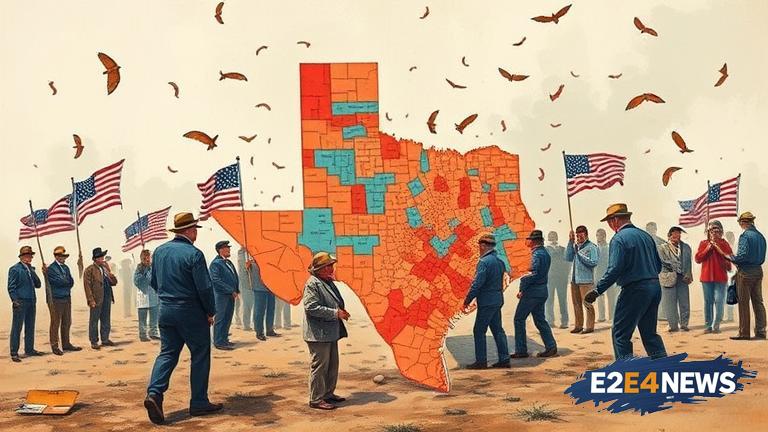The Texas redistricting vote has come to a standstill as Democrats have scattered across the state, boycotting the legislative session in an effort to prevent Republicans from passing new voting maps. The move has left Republicans without a quorum, making it impossible for them to hold a vote on the proposed maps. The Democrats’ decision to boycott the session was made in response to the Republican-led legislature’s attempts to push through voting maps that would heavily favor their party. The maps, which were drafted by Republicans, would likely give the party a significant advantage in future elections, potentially allowing them to maintain control of the state’s congressional delegation. The Democrats argue that the maps are gerrymandered and would disenfranchise minority voters, who tend to vote for Democratic candidates. The boycott has sparked a heated debate over voting rights and the role of partisan politics in the redistricting process. Republicans have accused Democrats of abandoning their duties and attempting to undermine the democratic process. Meanwhile, Democrats argue that they are fighting to protect the rights of minority voters and ensure that the redistricting process is fair and transparent. The standoff has significant implications for the future of Texas politics, as the state’s congressional delegation is expected to play a crucial role in determining the balance of power in Washington. The redistricting process is typically a contentious one, with both parties vying for control of the maps. However, the current standoff in Texas is particularly notable due to the state’s growing population and increasing diversity. The maps proposed by Republicans would likely lead to a significant shift in the state’s congressional delegation, potentially giving the party a stranglehold on power. The Democrats’ boycott has been met with support from civil rights groups and voting rights advocates, who argue that the proposed maps would have a disproportionate impact on minority voters. The groups have accused Republicans of attempting to suppress the vote and undermine the democratic process. The standoff has also sparked a national debate over voting rights, with many arguing that the Texas redistricting process is a microcosm of the larger struggle for voting rights across the country. As the situation continues to unfold, it remains to be seen how the impasse will be resolved. The Democrats have vowed to continue their boycott until the proposed maps are revised to address their concerns. Meanwhile, Republicans have threatened to take drastic measures to break the quorum, including arresting absent Democrats. The situation has significant implications for the future of Texas politics and the balance of power in Washington. The redistricting process is a critical component of the democratic process, and the current standoff in Texas highlights the need for fair and transparent maps. The debate over voting rights and the role of partisan politics in the redistricting process is likely to continue, with the outcome in Texas having significant implications for the country as a whole. The situation is being closely watched by voting rights advocates and civil rights groups, who are eager to see how the impasse will be resolved. The Texas redistricting vote has sparked a national conversation over voting rights, with many arguing that the process is critical to ensuring that all citizens have an equal voice in the democratic process. As the standoff continues, it remains to be seen how the situation will be resolved and what implications it will have for the future of Texas politics.
